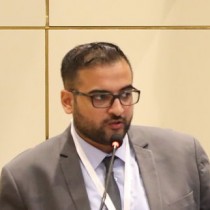This week's briefing on recent news and upcoming events in the region featuring Gerald Feierstein, Mirette F. Mabrouk, Fatima Abo Alasrar, Marvin G. Weinbaum, and Yesar Al-Maleki.
Pompeo’s Middle East farewell tour
Gerald Feierstein
Senior Vice President

Traditionally, outgoing presidential administrations avoid pursuing new policy initiatives in the interregnum between elections and inauguration in order to leave the incoming team maximum space to craft their own policies. This has been the opposite of the approach taken by the Trump administration and Secretary of State Mike Pompeo. Following a first-ever visit by a senior U.S. official to an Israeli settlement in the Occupied Territories, Pompeo continued his tour to the Gulf, with stops in the UAE, Qatar, and Saudi Arabia. According to press reports, Pompeo’s tour also included facilitating a face-to-face meeting between Israeli Prime Minister Benjamin Netanyahu and Saudi Crown Prince Mohammed bin Salman (MbS).
Not all of Pompeo’s efforts will be unwelcomed by the incoming Biden administration. While likely not placing the same emphasis on the initiative as the Trump administration, the Biden team will nevertheless not be averse to an Israeli-Saudi normalization in principle. Nor will they oppose Pompeo’s efforts, per the statement by National Security Adviser Robert O’Brien, to resolve the intra-GCC dispute with Qatar.
But other aspects will be less well-perceived by the new administration. Pompeo has been clear that the Trump administration will continue to look for ways in its waning hours to cement its “maximum pressure” policy on Iran further and constrain the incoming administration. Iran was a key point of discussion in all of the capitals Pompeo visited. Moreover, if that was the predicate for the Netanyahu-MbS engagement, it will be problematic for the Biden administration, which has stated its policy goal of re-engaging with Tehran on the Iran nuclear deal. In addition, Pompeo was understood to be discussing with his interlocutors in the Gulf the possibility of designating Yemen’s Houthis as a Foreign Terrorist Organization, allegedly at Saudi, Emirati, and possibly Government of Yemen urging. If he proceeds with that move, it will make the Biden administration’s professed interest in playing a constructive role in resolving the Yemen conflict more difficult as well as undercut critical humanitarian relief programs.
@j_feierstein
Ethiopia’s worsening crisis could have worrying regional ramifications
Mirette F. Mabrouk
Senior Fellow, Director of Egypt program

For almost a decade, the Grand Ethiopian Renaissance Dam (GERD) has been the major focus of discussion, contention, and worry between Egypt, Ethiopia, and Sudan. Last week, Sudan pulled out of the latest round of talks, which it blasted as “pointless,” and “going around in circles.” However, a rapidly escalating conflict in Ethiopia, which threatens to degenerate into a full-blown civil war, has, unsurprisingly, pushed the issue of the dam onto the back burner.
On Nov. 4, Ethiopian federal government forces began pounding the country’s Tigray region after Prime Minister Abiy Ahmed accused its government of a raid on a federal army base. Relations between Ahmed’s administration and the Tigray regional government have been testy since he became prime minister in 2018 and started consolidating power, effectively shearing it from the Tigray People’s Liberation Front (TPLF), which had ruled the country for over two decades. Things started to come to a head when scheduled elections were cancelled this summer, due to COVID-19, according to the federal government. While most of the country’s ethnic minorities were livid at this, it was the TPLF that went ahead and held regional elections in September where, perhaps unsurprisingly, they won all the contested seats. The elections were declared null and void by the federal government.
The situation is complicated by several issues, not least of them the fact that, while the Tigray make up around 6 percent of Ethiopia’s population, the region is home to the federal army’s Northern Command, with its battle-hardened troops, alongside the contested and as yet undemarcated border with Eritrea. The day before the federal government attacked, the TPLF had taken over military equipment and personnel.
The situation is alarmingly vulnerable to spiraling out of control. The country’s economy, once one of the continent’s most promising, is taking a serious hit. According to Bloomberg, major investors are shying away — the international wireless giant Vodacom is holding back investment while it monitors the crisis and KCB, Kenya’s largest bank, is delaying a planned expansion. As of Nov. 18, Ethiopian Eurobonds had been sold off for nine straight days. Ahmed has refused all international calls for a cease-fire or arbitration and the U.N. has warned of the risks of a civil war. As of Monday, over 40,000 refugees had poured over the border into neighboring Sudan, threatening to place ever more strain on an already vulnerable country.
Ultimately, though, it’s possible that Sudan might not be as vulnerable or helpless as it first appears. To date, it has officially closed its borders with Ethiopia, cutting off the Tigray region’s only access to fuel, food, and ammunition outside Ethiopia. Sudan previously had good relations with the TPLF under the deposed President Omar al-Bashir, but they have cooled since the TPLF lost control of power in Ethiopia. However, it could, theoretically, hold the Ethiopian federal government’s feet to the fire, by dangling the prospect of aiding the TPLF against concessions over the contested Fashqa triangle and the GERD. It’s a double-edged sword, though, as Ahmed could easily provide support to Sudanese rebel groups along the Ethiopian-Sudanese border, threatening an already fragile transition. To date, Sudan is officially being deliberately neutral.
Outside involvement would almost certainly ensure that the conflict becomes even more drawn out and bloody. Eritrea is already suspected of involvement — its leader, Isaias Afwerki, has a long, rancorous history with the TPLF — although the country has strenuously denied it. There has also been speculation that the third party of the GERD triangle, Egypt, while not involved in any way, would benefit from the political fallout of an Ethiopian civil war. That view is not unreasonable but it is reductive and shortsighted. Civil wars are messy, destructive creatures with entirely unpredictable outcomes. A slightly off kilter Ethiopia, with reduced bargaining power, would be desirable to Egypt. An Ethiopia mired in a civil war that threatens to engulf the Horn of Africa, where Egypt has been busy building and investing in trade relations, would not.
Last week, Egyptian Foreign Minister Sameh Shoukry met with his Eritrean counterpart, Osman Saleh, and Eritrean Presidential Adviser Yemane Gebreab. Shoukry apparently stressed the importance of Horn of African security. Egypt is particularly worried about Sudan, its immediate neighbor and the source of an estimated near 3 million refugees in Egypt (only around 50,000 of whom are actually registered). Egypt has been scrambling to mend diplomatic, economic, and military ties that had been damaged in the almost three decades under al-Bashir and is acutely aware of the fragility of the country’s transition. In the wake of the economic fallout from the COVID-19 pandemic, both Egypt and Sudan need to concentrate on rebuilding their economies. A regional conflict is unlikely to be on their wish lists.
@mmabrouk
Designating Yemen’s Houthis: First do no harm
Fatima Abo Alasrar
Non-resident Scholar

The Trump administration is reportedly considering designating Yemen's Houthi militia as a Foreign Terrorist Organization (FTO), a move that the Department of State has been contemplating for the past two years as part of its broader effort to roll back the Iranian regime's influence in the Middle East. But if this move is not studied carefully, it could impact Yemenis at large and complicate the peace process without providing significant value to U.S. strategic interests in the long term.
The Houthi movement, which continues to receive military backing from Iran, has solidified its gains since its overthrow of the U.N.-backed Hadi government in 2014. It has grown in strength and numbers despite a conventional war waged by the Saudis and Emiratis to limit its influence. But the Houthis have thrived and expanded due to the circumstances created by the Gulf intervention, which isolated them and helped them become a de facto non-state actor in a country built on informal networks and governed mostly through strategic alliances and customary rules. Many within the Houthi network, including those in senior positions, are in a coalition with the Houthis out of necessity and circumstance rather than actual conviction. An FTO designation is likely to further isolate the Houthis and implicate many who would not have otherwise allied with this group.
For an FTO designation to be effective, the process must be flexible in considering various factors that will serve the United States' diplomatic and strategic interests while minimizing the risks that could affect the Yemeni people or impair the work of humanitarian organizations. Some experts argue that instead of a large sanctioning decision, the administration could move to sanction core individuals in the Houthi organization, whose open hostility and calls for attacks on the United States justify their designation as terrorists. However, the conundrum is that these individuals are still seen as key figures in the peace process because they are a fundamental part of the de facto authority that negotiates on behalf of the Houthi group.
Ultimately, what is needed is long-term strategic engagement from the United States on Yemen, which is non-existent at present. The current and future administrations need to focus on finding peace in Yemen and ensuring that their decisions do not negatively impact the humanitarian situation in the country and the well-being of Yemenis in general.
@YemeniFatima
Imran Khan’s Pakistan makes nice with Afghanistan
Marvin G. Weinbaum
Director for Afghanistan and Pakistan Studies

Pakistan and Afghanistan share much besides their common border and Islamic heritage, including their overlapping economies, Pashtun ethnic populations, and struggles with violent extremism. But no feature in common is more regularly on display than their mutual distrust. Thus, the warmly received visit to Kabul late last week of Pakistan’s Prime Minister Imran Khan together with a high-ranking delegation is noteworthy. Official visits between the two countries are not unusual, but a document expressing shared visions on peace, economic development, and regional cooperation goes well beyond anything previously agreed to. So too does the range of steps outlined to implement the stated core areas of agreement. For countries more accustomed to airing their suspicions of each other, the warmth displayed during meetings also set this visit apart. Khan went out of his way to express sympathy for the Afghan people’s decades of suffering and assured Afghan President Ashraf Ghani that Pakistan “would do everything possible to reduce violence.”
Skeptics will naturally question whether Khan’s visit to Kabul represents a breakthrough in relations or is just a well-orchestrated diplomatic exercise. Is it, as might be argued, mostly just about Khan’s efforts to burnish his foreign policy credentials? The bilateral agreement contains several potentially significant but normally contentious areas for cooperation. One calls for the two countries’ intelligence services to work together “against the enemies of peace.” It was the hostile reaction in Afghanistan to proposed intelligence sharing with Pakistan that sunk an early attempt by Ghani to put relations with Pakistan on a better footing. The document also speaks generally of an emphasis on trade and the free movement of goods and services. But it gives no indication that Pakistan may be prepared to relent on its deeply resented blockage of trade transiting from India to Afghanistan. Another mentioned deliverable is the development of a joint proposal on the orderly return of Afghan refugees in Pakistan that along with other border issues has been a source of tension between the countries. Absent, not at all surprisingly, is reference to the issue that has above all others for more than 70 years poisoned relations between Afghanistan and Pakistan: the colonial drawn Durand Line.
The Kabul meeting comes at a rather precarious stage in the tottering Afghan peace process. It also takes place in the wake of the U.S. announcement of an intention to draw down nearly all troops in Afghanistan. Despite Pakistan’s winning praise from the U.S. for facilitating peace talks, most Afghans remain convinced that the Pakistan establishment is a major sponsor of the Taliban insurgency and is actively undermining the current intra-Afghan negotiations. Few will be convinced of Pakistan’s sincerity in preferring peace without evidence of the Taliban agreeing to a cease-fire and a political settlement. The one plainly incontestable takeaway from the Kabul accord is that neither country can hope to achieve lasting peace and stability without peace and stability in the other.
This article was co-authored by Ghasharib Shoukat, Jack Stewart, and Hamid Safi, research assistants to Marvin G. Weinbaum.
@mgweinbaum
Cautious but steady: Riyadh-Baghdad rapprochement
Yesar Al-Maleki
Non-resident Scholar

Saudi Arabia and Iraq are building rapport by basing their relationship on shared concerns: security, global oil markets, and economic interests. A virtual summit between Iraqi Prime Minister Mustafa al-Kadhimi and Saudi Crown Prince Mohammed bin Salman earlier this month and the re-opening of the Arar land border crossing after 30 years were the culmination of a patient engagement by both governments over the past four years. A change in leadership on both sides and a new focus on pragmatism paved the way for the breakthrough, especially in Baghdad, as Haider al-Abadi successfully utilized international support during the fight against ISIS to pivot into the Arab world. Riyadh gradually shifted toward mending ties with Iraq’s Shi’a Arab moderates after years of financial support for Sunni Arab politicians and organizations, taking advantage of rising Iraqi nationalism and anti-Iranian sentiment as demonstrated by Iraq’s youthful protest movement.
In the short term, Riyadh aims to maintain Baghdad’s commitment to the OPEC+ oil production cuts crucial for its revenues. Driving them, Saudi Arabia was able to preserve 80% of its 2020 forecast oil revenues. In comparison, Baghdad lost 47.5% of its revenues in the first eight months of 2020. Iraqi oil production is at a five-year low and a reversal in Baghdad’s oil policy, however technically and financially challenging, could flood oil markets and depress prices earlier than other producers aim. For Saudi Arabia, Iraq’s economic fragility is a threat to the deal’s sustainability. Other objectives include tapping into Iraq’s import-reliant market and winning key energy infrastructure projects.
For its part, Iraq sees an opportunity to bring in much-needed foreign direct investment from the Saudis, and hopefully other Gulf investors, and perhaps even a cash stimulus — money that would likely come with fewer preconditions for economic reforms and a lower political cost than that offered by multilateral lenders or international investors.
In the long run, Riyadh is positioning itself to counter Iranian and Turkish influence in Iraq. This is quietly welcomed in Baghdad by moderate factions across ethnic and sectarian lines. Tehran- affiliated actors have cautiously watched this rapprochement in the last few years with minimal intervention; at the end of the day the practicalities of business in Iraq dictate their indirect involvement and benefit. However, populist rhetoric against Saudi investments has picked up recently. This has capitalized on a dent in al-Kadhimi’s popularity as the government has struggled to pay public sector wages, and is aimed at appeasing the radical Shi’a base in the run-up to the 2021 elections.
While Baghdad’s economic expectations from Riyadh may be high, the Saudis have learned to be risk averse and focus on return on investment. The bitter taste of failed economic support to Lebanon still lingers. For now, the Saudis and Iraqis will have to continue building on their successful secular approach to re-engagement and translate it to mutually beneficial and purely economically viable ventures.
@yesar
Photo by Foreign Affairs Ministry of Israel / Handout/Anadolu Agency via Getty Images
The Middle East Institute (MEI) is an independent, non-partisan, non-for-profit, educational organization. It does not engage in advocacy and its scholars’ opinions are their own. MEI welcomes financial donations, but retains sole editorial control over its work and its publications reflect only the authors’ views. For a listing of MEI donors, please click here.













